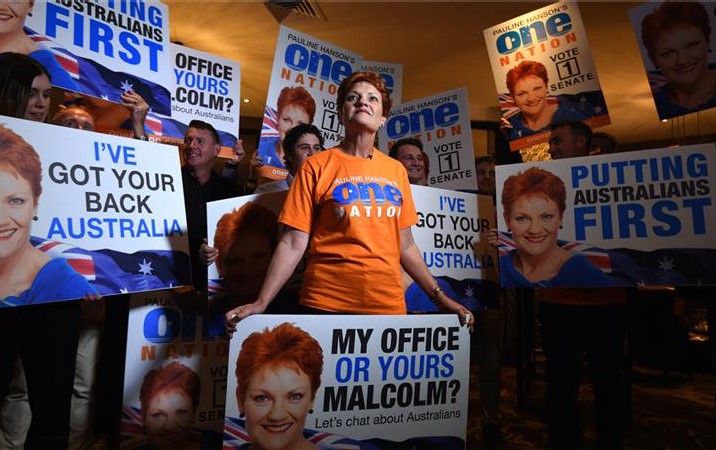AAP photo
By
Rupen Savoulian
One Nation, the anti-immigrant ultra-right wing political party, has made a huge comeback into Australian politics in the wake of the July 2 2016 federal election. This requires a number of observations to explain its rise, the underlying factors for its reemergence into national prominence, and its impact on Australian political life.
However, firstly, let us start with some definitions to set the parameters for this article, and subsequent discussion:
One Nation is the corresponding Australian analogue of the British far-right party, United Kingdom Independence Party (UKIP). The latter, having become widely known for its xenophobic and racist pronouncements during the Brexit campaign, shifted political debate in Britain sharply to the right. This is the same impact that One Nation has had, and is having, in Australia. The UKIP-ization of Australian political life refers to the growing trend in political debate of attacking immigration as a unique and insidious threat to the nation.
The term UKIP-ization is not originally mine, but was created by English sociologist and blogger Richard Seymour, whose writings are an incisive and perceptive commentary on the political situation in Britain. Seymour elaborated on the tendency by UKIP, and other similar ultra-right parties in Europe, to exploit anti-establishment discontent in the population, and to misdirect them into an anti-immigrant and pro-business electoral platform. It is no surprise that anti-immigrant politicking has found electoral expression in the right-wing forces coalescing around One Nation, because the established major parties have provided oxygen to toxic xenophobic sentiment for many decades. In an insightful article for New Matilda magazine, Michael Brull elaborates that without ideological and political support from major conservative political figures in Australia, such as former Prime Ministers John Howard and Tony Abbott, the One Nation party would not have found a responsive electorate.
Brull contends that One Nation and its leader, Pauline Hanson, deserve derision and scorn for the absurd and hateful comments they make. However, their statements do not occur in a political vacuum:
Hanson presents a lowbrow version of concerns that have been legitimised for years by the Coalition and major media outlets. The biggest difference is that they do so in more sophisticated language, aimed at a wealthier constituency. When wealthy and well-connected people use high-brow language to express the same concerns, their friends and associates come out of the woodwork to assure the public that it’s not racist. As this elite racism trickles down, and is expressed in more direct language, the elite disingenuously disowns it. In some ways, this is similar to the original rise of Hanson, except that the primary target then wasn’t Muslims, but Asians.
Let us not forget that racism is not an exclusively working class manifestation; the financial and political elite, which often wraps itself in a cosmopolitan disguise, is the origin of Australian racism. As Brull explains it:
Hanson didn’t invent anti-Asian racism. It was a low-brow version of the anti-Asian position led by conservative luminaries Blainey and Howard for over a decade. Blainey had not himself said he was opposed to Asian immigration. Instead, he had ventriloquised supposed working-class angst. They were the ones whose anti-Asian racism we had to cater to and worry about. This position then slowly trickled down, and found its new political advocate in Hanson. She did not use his sophisticated framing, or highbrow language. She argued crudely that she didn’t want so many Asians in Australia.
Just Hanson’s ground was paved for her, so the Liberals went down the path she suggested. The other day, her Facebook page replied to a critic suggesting that One Nation would never be able to deliver on their policies. She retorted quite effectively: “I guess the idea of temporary protection visas, the abolishment of ATSIC, offshore detention processing centres, the deportation of foreign criminals, the reduction in immigration numbers sound ‘crazy’ to you? They were all policies of mine adopted by John Howard and the Liberals.”
The Australian capitalist social pyramid has been white at the top – but has allowed a few non-Anglo-origin faces into its ranks to maintain the illusion of racial harmony. At the bottom of the pyramid, it is definitely multi-ethnic and multi-coloured – with the first nations of Australia squashed beneath the base. Let us not ignore the well-educated and financially secure bigot; being part of the financial elite does not endow a person with non-racist sentiments. One Nation plays on this issue; posing as a champion of working people, it portrays the ‘Aussie worker’ as being the victim of an immigrant-friendly and economically powerful multicultural elite. Make no mistake – Australians of all backgrounds have seen a decline in their living standards, attacks on wages, the shifting of wealth from working people into the hands of the ruling class. The dislocation of the working class is very real, and people are looking for someone to blame.
In the case of UKIP, the European Union is the main target of their railing against alleged foreign influence – and they have conflated this imperialist institution with immigration and multicultural influences in Britain. In Australia, One Nation has made it a habit to mention immigration only in terms of ‘swamps’ – back in 1996, when Hanson made her first appearance in the federal parliament, her main concern was that Australia was being ‘swamped’ by Asians. In her most recent outburst, Muslims and Islam were the main targets of her worries about ‘swampyness’. These ravings could be summarily dismissed, were it not for two things. One, they were stated by elected politicians, and two – the mainstream Australian political establishment has gone to great lengths to embrace One Nation – politically and literally.
For all the talk about Australia being ‘swamped’ by Muslims, it does give us an opportunity to examine the census date about the percentage of Australians that profess the Islamic faith. Terms like ‘swamped’ are inflammatory, and do not serve any purpose except increase anxieties where none are warranted. What numbers exactly constitute ‘swamping?’ What percentage of the population would have to declare themselves practitioners of the Islamic religion in order to classify Australia as officially ‘swamped?’
If we examine the census data, there is no evidence that Australia is in any danger of being overwhelmed or ‘swamped’. While the religion of Christianity remains the most commonly reported religion, a growing number of Australians reported no religion. Of all the non-Christian religions, Islam, Hinduism and Buddhism, it was Hinduism that experienced the fastest growth. All the non-Christian religions reported an increase in adherents, and Islam is growing in tandem with other non-Christian religions. In other words, Islam is growing – at comparable rates to the growth of other non-Christian religions. If this is evidence of ‘creeping Islamisation’, the rate of ‘creeping’ is so slowly as to be barely noticeable as compared to other religions. Moral panic may provide Australians with an activity to keep them busy, but it is unhelpful and counterproductive in understanding the source of our economic and political problems. The veracity of the ‘threat’, or lack thereof is not an issue anymore – once the voting public buys the ostensible threat, social anxiety takes over.
The themes developed by One Nation are given prominent media coverage, and this helps to channel working class discontent into xenophobic and militarist directions. The ultra-right wing politicians such as One Nation, tap into legitimate social concerns, such as high unemployment, lack of social services, growing hospital queues, and cutbacks to education. However, they play a diversionary role, directing their fire at immigrants, single mothers, indigenous people, welfare recipients – minority and marginalised groups that have also suffered under the austerity drive by the ruling class. The problems of the capitalist system are not based in immigration or multiculturalism, or caused by excessive services to indigenous Australia, but by inequality. In an article for Green Left Weekly, Susan Price wrote that:
Even in Australia, the top 1% have more than 22% of the total Australian wealth and own more wealth than 70% of Australians combined.
The poorest 50% of Australians have only 6% of national wealth between them.
Australia’s “1%” includes the two richest billionaires, Gina Reinhart and Blair Parry-Okeden. Between them they have more than US$16 billion — which is more than the combined wealth of the poorest 20% of Australians.
Far from lifting people out of poverty, the policies imposed on poorer countries by the international financial institutions, such as the World Bank, the International Monetary Fund and the European Central Bank have led to privatisation of public services and cuts to health, education and welfare, throwing millions into poverty and despair.
If there is a swamp threatening Australia, it is the tide of ignorance and bigotry that One Nation, and its associated political partners, make respectable. Under conditions of an ever-deepening capitalist economic crisis, let us make sure that the architects of the corporate oligarchic state do not misdirect the anger of the people towards the vulnerable and the marginalised. Do not confuse capitalist globalisation with internationalism; the drive for greater markets and corporate profits is a necessary component of the capitalist system. The axis of cooperation between Canberra, London and Washington has always been pivotal in maintaining the capitalist order. The main financial institutions of these three capitalist powers have always partnered up to super-exploit labour. Do not confuse the movement of capital between states and the movement of people; the economic priorities of the corporate states have always determined and controlled the movement of labour.
Rupen Savoulian
I am an activist, writer, socialist and IT professional. Born to Egyptian-Armenian parents in Sydney, Australia, my interests include social justice, anti-racism, economic equality and human rights.



No Comments Yet!
You can be first to comment this post!